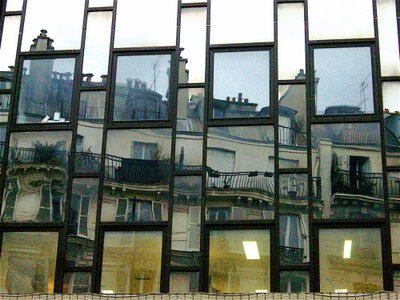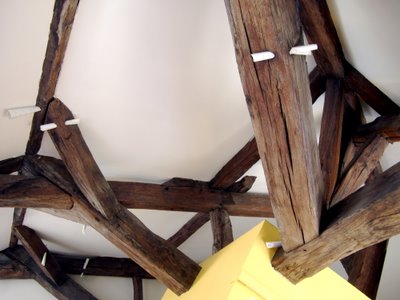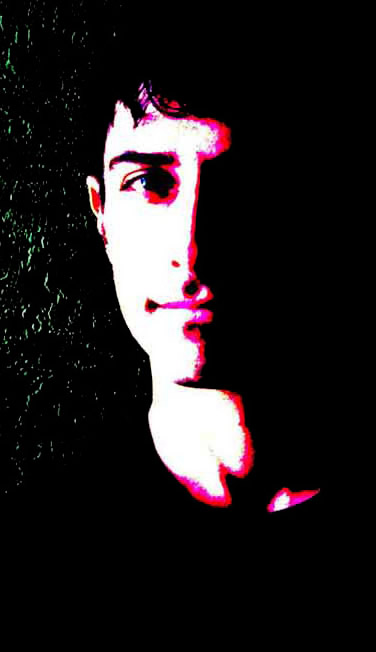Paris diary post-mortem 1: DONE

So much to catch up on. The diary died, maybe you noticed. After a three-week resurrection of the computer, it re-died. This morning I finished my book ("finished" is an absurd exaggeration). Lots of other stuff! Let me confine this diary entry to whatever it is that I did to my novel by taking it to the local Office Depot for printing and binding twenty minutes ago.
First of all I should say that, while this is a speculative judgment - I haven't read the book, personally - I can confidently proclaim it the third draft of a masterpiece. The only question is whether it's the third of three drafts, which should see the book published in 2010, or of nineteen, in which case I'll just combine the book party and my 80th birthday celebration (it's coming up!). Only time and, my railings against critical feedback notwithstanding, the opinion of one or more literary agents, editors, and other cruel readers will tell.
The third draft was written by printing out the morbidly obese second draft, opening up a new Word document, and composing the new draft entirely from scratch. The idea was that if, as Virginia Woolf observed regarding Orlando's struggle to write, the cardinal labor of composition is excision, it would be much easier to spend my hours making positive choices (include this) rather than negative ones (delete this piece of shit scene that I frankly can't believe you had the unfathomable mediocrity to write in the first place).
As far as excision goes, the experiment worked. The second draft weighed in at 340,000 words, about three times longer than a debut novel is permitted to be, and the third draft is just over half that, about 177,000 words. In the revision of the third draft I'll cut another 77,000 words and Random House will have no choice but to shell out a million-dollar advance.
And that will be publishing industry highway robbery! The other night I was out with American book professionals / enthusiasts and we were talking about how badly most books end. Take Anna Karenina - please! I said matter-of-factly that my novel had a fabulous ending - I was going to write it that week - and was taken aback when everyone laughed. I am not being funny. If a Tolstoy ending is Jack Benny, mine is Jascha Heifetz.
Conservative predictions: the novel will win prizes. It will be sold in supermarket display racks, airports, Costco. I don't want to sound grandiose but I seriously think they might sell it at Wal Mart. The Pope will issue a fatwah against me; Oprah will offer to be my bodyguard. It's that good! Or will be on the 19th draft. It has everything! Love, death, survival, survival guilt, sex, gender euphoria, spectacle, violence, marijuana, compost. Miracles, resurrections, immolations, DEA helicopters. Literally tons of ganja. Candy-flipping, Janacek, Celexa, twins, Dilaudid, Christianity, black acid, paganism, BuSpar, Macon GA, Xanax, Beverly Hills, Sudafed, Boonville, crystal meth, Radical Faeries. It has not one but two languages of its own making, not one but two prophets for post-capitalist America. It has readability, charm, irresistibility. It's never maudlin, but you will cry; it's often cheap, and you will laugh. Michelle Obama will read passages aloud to Barack, but only after they've put the girls to bed. The Church will never recover.
It's an important book. I get these anxiety attacks about finishing, like what if I don't live that long? The other day I was walking in front of the Gare du Nord when a gaggle of French soldiers came out dressed in machine guns and extra rounds. I scurried away from them down the Rue de Dunkerque, thinking I must avoid guns until after the novel is finished.
Because as sincere as I am in all this love for and pride in the novel, I am haunted by a few things. One is a quote I hope someone will help me source, in the comments, something along the lines of, "To love what one has written is to love it a little too much." Another is the 2nd draft. When I finished it after 7 weeks at the MacDowell Colony, in December 2006, I don't believe I proclaimed it a masterpiece, but I felt pretty good about it. Now the shame that burns my skin when I read the second draft curdles milk in the refrigerator on the other side of this huge studio. I hope to incinerate that draft it in the fire pit in the courtyard as part of James's going-away party Saturday, and meanwhile I found a nice use for selected pages when I finally got so annoyed by the mysterious inch-and-a-half holes drilled through the beams in my studio that I did this:

I'm still waiting for that advance, my laptop is still dead, and your contributions are still tax-deductible.
Labels: Anna Karenina, artist retreats, fiction, Paris, the novel, writing

